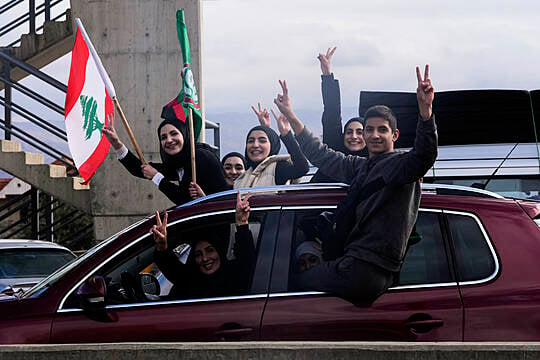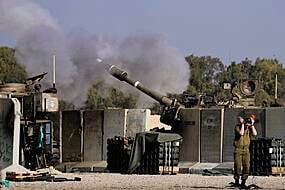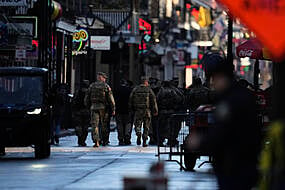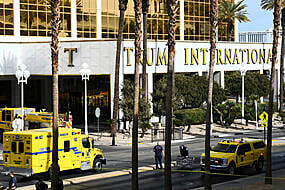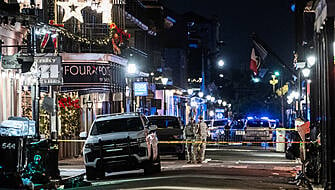A ceasefire between Israel and the Lebanese militant group Hezbollah appears to be holding.
Residents in cars heaped with belongings began streaming back towards southern Lebanon, despite warnings from the Israeli and Lebanese militaries that they should stay away from certain areas.
If it holds, the ceasefire would bring an end to nearly 14 months of fighting between Israel and Hezbollah, which escalated in mid-September into all-out war and threatened to pull Hezbollah’s patron, Iran, and Israel’s closest ally, the US, into a broader regional conflagration.
The deal does not address the war in Gaza, where Israeli strikes overnight on two schools-turned-shelters in Gaza City killed 11 people, including four children, according to hospital officials. Israel said one of the strikes targeted a Hamas sniper and the other targeted militants hiding among civilians.
The truce in Lebanon could give some reprieve to the 1.2 million Lebanese displaced by the fighting and the tens of thousands of Israelis who fled their homes along the border.
The deal brokered by the US and France, which was approved by Israel late Tuesday, calls for an initial two-month halt to fighting and requires Hezbollah to end its armed presence in southern Lebanon, while Israeli troops are to return to their side of the border.
Thousands of additional Lebanese troops and UN peacekeepers would deploy in the south, and an international panel headed by the US would monitor compliance.
Israel says it reserves the right to strike Hezbollah should it violate the terms of the deal.
Today, I have good news to report from the Middle East.
I have spoken to the Prime Ministers of Lebanon and Israel. And I am pleased to announce:
They have accepted the United States’ proposal to end the devastating conflict between Israel and Hezbollah.— President Biden (@POTUS) November 26, 2024
Advertisement
Prime Minister Benjamin Netanyahu’s office said troops arrested four Hezbollah operatives, including a local commander, who had entered what it referred to as a restricted area. It said troops have been ordered to prevent people from returning to villages near the border.
Israel is still fighting Hamas militants in Gaza in response to the group’s cross-border raid into southern Israel in October 2023. But President Joe Biden said his administration would make another push in the coming days to try to renew efforts for a deal in the war-ravaged Palestinian enclave.
Hours after the ceasefire came into effect, thousands of people drove south from Beirut with their belongings and mattresses tied on top of their cars. Traffic was gridlocked at the northern entrance of the port city of Sidon.
Sporadic celebratory gunfire was heard at a main roundabout in the city, as drivers honked their horns and residents cheered.
The Israeli military warned displaced Lebanese not to return to evacuated villages in southern Lebanon, where Israeli troops were still present following the ground invasion in early October. The Israeli military said forces opened fire to push back a number of vehicles that were entering a restricted area.
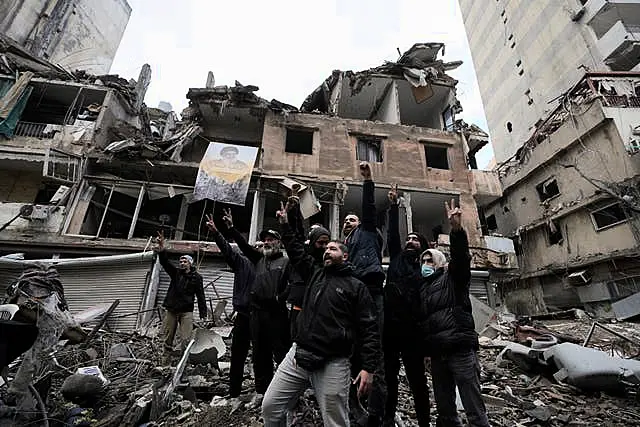
Three journalists, including a freelance photographer working for the Associated Press, said they were shot and wounded by Israeli troops while covering the return of displaced people to the town of Khiam, around four miles from the border, which had seen heavy fighting in recent days. The Israeli military said it was investigating.
An Israeli security official said Israeli forces remain in their positions hours after the ceasefire began and will only gradually withdraw.
The official said the pace of the withdrawal and the scheduled return of Lebanese civilians would depend on whether the deal is implemented and enforced.
The Lebanese military asked displaced people returning to southern Lebanon to avoid frontline villages and towns until Israeli forces withdraw.
Residents will return to vast destruction wrought by the Israeli military during its campaign, which flattened entire villages. The military said it found vast weapons caches and infrastructure it says was meant for Hezbollah to launch an October 7-style attack on northern Israel.

More than 3,760 people have been killed by Israeli fire in Lebanon since the start of the conflict, many of them civilians, according to Lebanese health officials.
In Israel, the mood was far more subdued, with displaced Israelis concerned that the deal did not go far enough to rein in Hezbollah and that it did not address Gaza and the hostages still held there.
“I think it is still not safe to return to our homes because Hezbollah is still close to us,” said Eliyahu Maman, an Israeli displaced from the northern Israeli city of Kiryat Shmona, which is not far from the border with Lebanon and was hit hard by the months of fighting.
The fighting killed more than 70 people in Israel, more than half civilians, as well as dozens of Israeli soldiers fighting in southern Lebanon.
A significant return of the displaced to their communities, many of which have suffered extensive damage from rocket fire, could take months.

Israel can claim major victories in the war, including the killing of Hezbollah’s top leader Hassan Nasrallah and most of its senior commanders, as well as the destruction of extensive militant infrastructure.
A complex attack involving exploding pagers and walkie-talkies, widely attributed to Israel, appeared to show a remarkable degree of penetration of the secretive militant group.
Hezbollah emerges from the war battered and bloodied, with the reputation it built by fighting Israel to a stalemate in the 2006 war tarnished. Yet its fighters still managed to put up heavy resistance on the ground, slowing Israel’s advance while continuing to fire scores of rockets, missiles and drones across the border each day.
